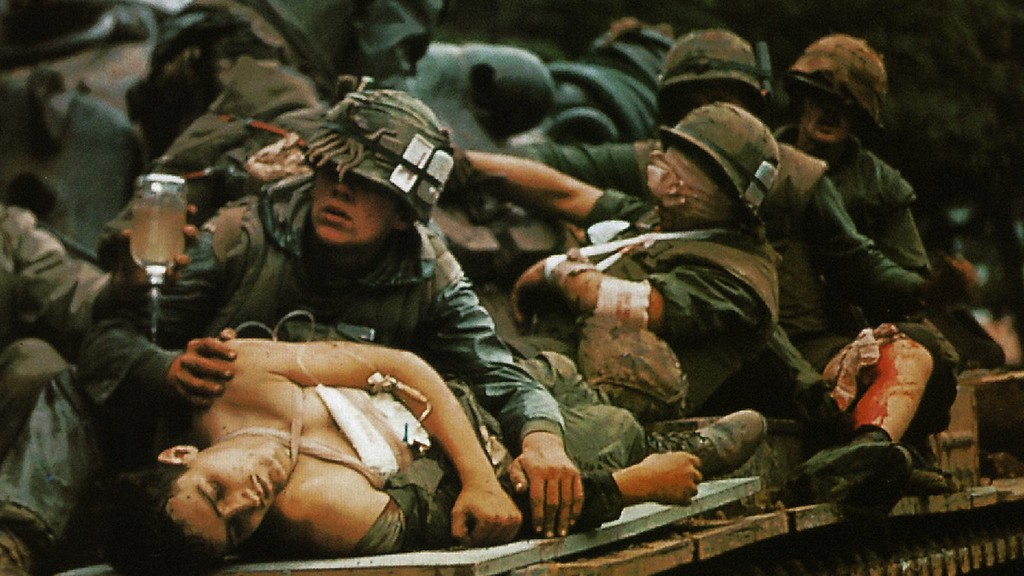Although the Tet Offensive did not spark a general uprising throughout South Vietnam as Hanoi had expected, it did make a major impact in the United States. This impact, albeit not their intention, turned out to be a fortunate result for them as it shifted American public opinion against the war and thus led to American constant de-escalation of the Vietnam war.
Daring Attacks
Months before the offensive, North Vietnam announced that they would observe a 7-day ceasefire in celebration of Lunar New Year or Tet, the most important holiday for the Vietnamese.
However, no sooner had South Vietnamese families begun their traditional Tet rituals than the Viet Cong attacked 13 cities in central South Vietnam in the early morning of January 30, 1968 – the first day of Tet. In the next morning, PAVN and Viet Cong forces launched more than one hundred coordinated attacks throughout South Vietnam. The element of surprise shocked both the U.S. and ARVN forces and helped the communists quickly capture many South Vietnamese cities and American strongholds.
Nonetheless, despite the initial success, North Vietnamese forces were spread too thin that the U.S. and ARVN forces managed to counteract most of the attacks and inflict heavy casualties on them.
Shocking the Public
However, it was not the heavy casualties of the PAVN and Viet Cong nor its failure to inspire a general revolt across South Vietnam but the communist bold attack on the U.S. embassy in Saigon, the bloody and lengthy Battle of Hue, the execution of a Viet Cong by the chief of South Vietnamese National Police, Nguyen Ngoc Loan and the carnage of U.S. troops on South Vietnamese streets that were closely reported and described in the U.S. media.
Those bloodshed and devastation wrought by the heavy fighting, along with pessimistic reports, which was brought directly to American living room, stunned every single American who watched it.
Losing the Media
While the U.S. involvement in Vietnam was generally supported by major television networks before Tet, reporters and newsmen began to alter their views toward the war, depicting it as a huge setback for the country right after Tet.
After a trip to Hue during the offensive, on February 27, CBS anchorman Walter Cronkite who was at the height of his influence voiced concern about the bloody war in Vietnam predicting that it would end in stalemate. Watching Cronkite’s report, President Johnson remarked to his press secretary, “If I’ve lost Cronkite, I’ve lost middle America”.
Worse still, the Wall Street Journal, which had supported the administration war effort in Vietnam until Tet, asked rhetorically whether the Tet Offensive “made hash of our original commendable objectives?”. On March 10, NBC television continued to question the U.S. whether it was pointless to “destroy Vietnam in order to save it” while five days later Time magazine join the chorus, suggesting that victory in Vietnam might just be beyond the grasp of the U.S.
As the media had a strong influence on the mainstream perspective, it inflamed the growing dissatisfaction of the public with Johnson administration’s policy in Vietnam, leading to even more anti-war sentiments and protests across the country.
Widening the “Credibility Gap”
Back in late 1967, many U.S. leaders including Gen. Westmoreland, had portrayed a very optimistic picture about the war in Vietnam that the Viet Cong was weakened, the U.S. had “turned corner” and that the end of the war in somewhere in sight. However, it was now clear that none of those could be further from the truth.
The Tet proved to many Americans that their government had been misleading them about American progress in the war. The “credibility gap” between the administration’s claims and reality was widened significantly. Many started to hold a more cautious and distrustful attitude toward their government as well as the war in Vietnam. Since then, the Vietnam war became more and more unpopular among American people.
To conclude, although Tet Offensive was a clear military defeat for the Viet Cong and PAVN on the battlefield of Vietnam, it made a huge impact on the U.S. home front. The offensive shocked American people and international observers, damaged the government’s credibility and caused a plunge in public support leading to American de-escalation of the war. Even though the peace talks would drag on for another 5 years, the Tet Offensive marked a crucial turning point in American involvement in the Vietnam War. Likewise, although the war itself would continue for another 7 years, the Tet turned the war in the communists’ favor and sowed the seeds for its eventual victory in 1975.
